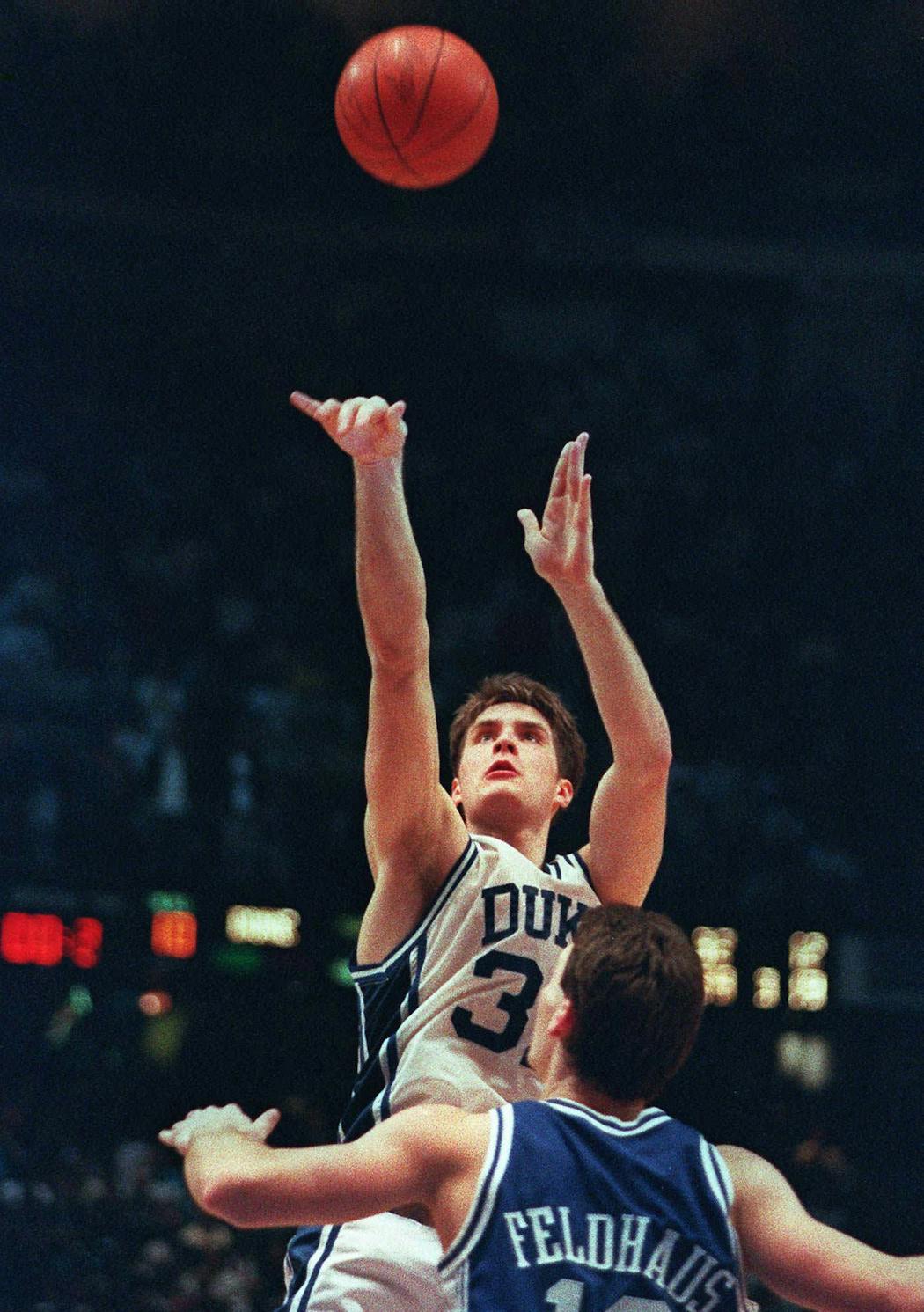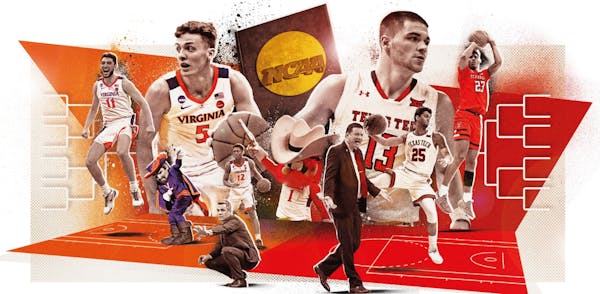Remembered just as he was then in the shiniest of all shining moments, two-time NCAA champion Christian Laettner nonetheless turns 50 in August.
Can that possibly be?
"That's right," he said. "My knees feel like I'm 50 and my back, too. It's hard to believe, but time flies."
You're reminded that his Duke teammate, Grant Hill, now is 27 years older because you've seen him working with his graying beard in NCAA tournament broadcasts leading to this weekend's Final Four in Minneapolis, site of the Blue Devils' historic title in 1992.
Same, too, with another famous former teammate, Bobby Hurley. And, of course, Duke coach Mike Krzyzewski. Both coached teams on this season's road to U.S. Bank Stadium, even if Krzyzewski's hair still is pitch black after these many years.
But in many ways, Laettner remains 22 years old in the mind's eye, because of the most iconic shot made in a tournament history overflowing with them.
His buzzer-beating shot defeated Kentucky in an overtime East Region final for the ages. It also completed Laettner's perfect shooting performance — 20-for-20, including free throws and field goals — that sent Duke to the Metrodome and a repeat championship not achieved since John Wooden's UCLA teams two decades earlier.
That moment — Hill's heaved, full-court entry pass with 2.1 seconds left, Laettner's catch above the free throw line, one dribble and turnaround shot that swished as time expired — still is replayed this time every year. Strangers ask Laettner about it nearly every day of his life.
"You see it every March Madness, and it makes you feel like it wasn't so long ago, except the film is getting grainy now," Laettner said.
"They have 4K now and everything looks so good on TV, but the film is starting to look a little grainy because it's so old. People still see me like I'm 22, but then they meet me at the airport and they're like, 'Hey, Laettner, you look old.'
"And I feel old and I look old."
Like no other
His hair has turned gray and there may be some lines now on his face. An NBA All-Star and Olympic gold medalist as well, he's a father of three — two college-age daughters and a teenage son — who lives near Jacksonville, Fla.
He also is an obsessed muskie fisherman; the Christian Laettner Basketball Academy schedules camps in destinations such as Pillager, Minn., where the fishing is good.
In 2006, he aspired unsuccessfully to buy part of the NBA's Memphis Grizzlies. In 2016, he settled years of debt from his real estate ventures when he reached a deal with creditors who had sought $14 million.
Laettner returns to the Final Four every April for corporate engagements and public appearances, mingling with fans about what once was. This time, he returned to not only the city where his Duke team repeated but also home to Minnesota, where the Timberwolves' third overall draft pick that same summer started his 13-year NBA career.
"I think that was the first time I was ever in Minnesota," Laettner said. "All my family, all my friends drove over from Buffalo [N.Y.] I think they drove halfway through Canada to get there."
Other NCAA tournament greats came before him. Bill Russell's San Francisco teams won back to back in the 1950s. Lew Alcindor — now Kareem Abdul-Jabbar — won three consecutive championships at UCLA a decade later. Bill Walton's consecutive title teams there in the early 1970s fell one short of matching Alcindor.
Like Walton, Laettner was toughened by an older brother merciless in their childhood backyard competitions. But Laettner remains "unique," as Krzyzewski often described him, because his competitive flame burned so brightly. He also played more recently in memory and one year longer.
"I'll take that," Laettner said. "I was unique and still am unique."
Love and hate
An underrated athlete with terrific hand-eye coordination, he could walk balanced on his hands 94 feet from one baseline to the other, something you just don't see a 6-foot-11 man do.
He's also the only player who started in four Final Fours, in an era when — unlike the aforementioned three — freshmen are eligible. His tournament-record 407 points scored in 23 games still stands. More important, his performances grew just as an already big stage did, too.
Those Duke teams were extraordinarily talented and tough, a traveling rock show in which Hill and Hurley were stars in their own rights. But Laettner was what ESPN analyst Jay Bilas called its "supernova" who made teenage girls swoon.
"Maybe some of our guys thought the girls were there to see them," said Bilas, a Duke assistant at the time, "but they weren't."
Duke fans in turn loved a ruthlessness Laettner unleashed at opponents and sometimes his own teammates, too. Most everybody else loathed — some still do — Laettner's good looks, his skill, and both his and Duke's perceived arrogance. Kentucky fans will argue to their graves Laettner shouldn't have been in that game after he earlier had purposely stepped on a Wildcats player's chest.
Such emotions fueled an ESPN "30 for 30" film entitled "I Hate Christian Laettner" that aired 23 years later, in 2015.
"If they make a '30 for 30' about you, you've turned some heads," said Utah Jazz coach Quin Snyder, who was a Duke senior when Laettner was a freshman. "From the minute he came on campus, you knew he was going to be really good. But no one could have envisioned the career he had."
Search the internet and you'll find that "hate" sentiment expressed on T-shirts for sale. The man himself has stocked such shirts for benefit causes as well as "I Love Christian Laettner" ones.
"I have those, too," Laettner said. "They're way back in my closet. They don't sell as well."
Embracing the moment
Krzyzewski took seven consecutive Duke teams to the tournament, including two title games, before Laettner, Hurley and Hill won not only the coach's first championship but two consecutively. Johnny Dawkins never won one. Neither did Danny Ferry.
Laettner twice made buzzer-beaters to send his team to Final Fours. The first defeated Connecticut in the 1990 East final his sophomore year, when Duke advanced only to get crushed by Larry Johnson and UNLV in the title game.
The next year, he assuredly made two late free throws that ended the Rebels' repeat 34-0 season in a Final Four semifinal still considered one of its greatest upsets. Krzyzewski told his assistants reviewing the game later that Laettner might miss a shot but he'll never choke.
"He was never afraid of the moment," Bilas said. "He only thought about doing. He never thought about not doing, and he wasn't afraid of not doing. It was like he was immune to the consequences of missing."
A year after that, Laettner broke all of Kentucky's heart with that one final shot. Held down offensively — and perhaps emotionally hung over as well — in the Final Four, he emerged in the second half of the championship game against Michigan's Fab Five to help deliver Duke's second title.
"He's top-three, maybe top-five all-time, and I say that because I want to be generous and respectful of some of the real legends who have gone before us," said Hill, the Atlanta Hawks' part owner and commentator for TNT/NBATV who'll call Monday's NCAA title game for CBS. "It wasn't one moment. Christian had multiple moments, multiple great buzzer-beaters, games, plays throughout his four years. That's what separates him from most the others."
After the 1992 draft, Krzyzewski told Wolves coach Sidney Lowe that he's the apartment superintendent and Laettner is fire that either can warm tenants all winter or burn the whole building down.
Unforgettable
Laettner and that Duke team were the last of an era, when players stayed in school and teams stayed together for four years. The 1992 title game, with Michigan's Chris Webber and four other fabulous freshmen, ushered in a new one.
"That was so long ago, and people still remember," Hill said. "It's a reflection of the times we're in now. Great players on a Laettner's level are not in school long enough now. They're only here one year.
"You don't really get a chance to see them, to get to know and learn their stories. Whether you liked Christian or not, I think you saw him."
Young players who attend his basketball academy haven't forgotten him because they never knew him. But their parents did.
"They don't know me, but then the parents pull out their phone and show them a clip on YouTube," Laettner said. "Then it all registers. When they look on their phone and Google it, then they know."
That video might seem grainy, but it lives on, just as Laettner does in all his youth.
"People remember," Hill said. "People remember Christian when he's 50. They'll remember him when he's 60.
"He was a great player who did it on that stage and played on some great teams. It's just a reminder of a forgotten era in college basketball."
Lillard practices fully and Antetokounmpo remains out of live drills as Bucks prepare for playoffs
Olympic organizers unveil strategy for using artificial intelligence in sports
Olympic torch makes Acropolis overnight stop a week before handover to Paris organizers
Quarterback of the future? This Vikings mystery is about to end.



